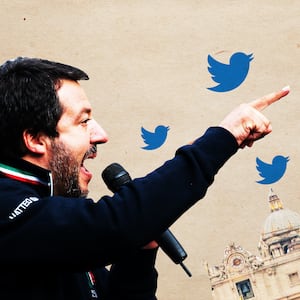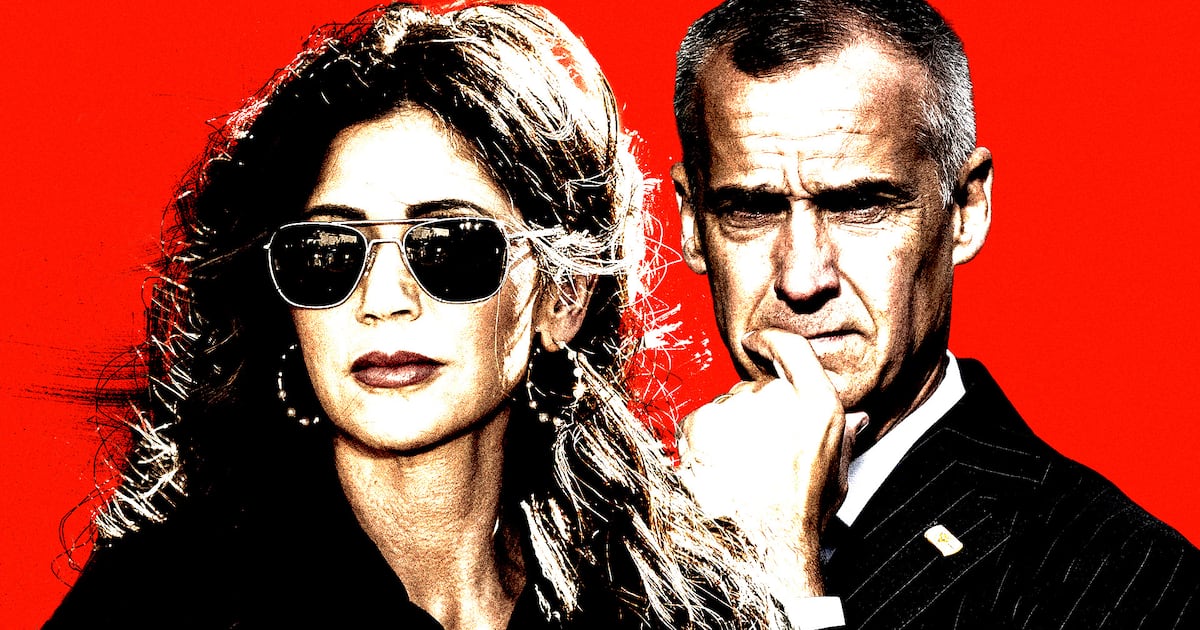ROME—Italians overwhelmingly voted to give power to the most far-right government since Benito Mussolini was thrown out of power and hung from a gas station girder after World War II with the clear victory of Giorgia Meloni and her Brothers of Italy party—along with coalition partners Matteo Salvini and Silvio Berlusconi.

Lega leader Matteo Salvini sports a Donald Trump mask.
Alessandro Bremec/GettyMeloni now looks set to become the first female leader of one of the biggest economies in the world and told a crowd of supporters at her final campaign rally in Rome’s Piazza del Popolo that the world was wrong to be afraid of her after widespread condemnation of her alt-right politics heading up to the vote. “What are they afraid of?” she yelled as the crowd chanted: “Giorgia! Giorgia! Giorgia!”
Plenty, the answer should have been. She hates immigrants and, it often seems, women. She has campaigned against reproductive rights like abortion and LGBTQ rights, lauding instead the traditional family even though she is an unmarried mother and daughter of a single mom.
Meloni is very much a creation of one of her biggest supporters, Steve Bannon, who traveled to Rome during the last election campaign in 2018 and headlined her ultra-conservative party conferences. He also made sure she was a speaker at CPAC, where in 2022 she echoed some of the world’s most extreme leaders, including Viktor Orban of Hungary, whoM she considers a close friend and ally in Europe.
Meloni cut her political chops as a member of the fascist Italian Social Movement, formed by Mussolini supporters after his deposition and death. She was the youngest vice president of the group before it dissolved after a government decree that fascist parties were banned.
She later joined the National Alliance, which grew from the ashes of the previous party, and rose in the ranks until she created her own party, called Brothers of Italy, which boasts a tri-color flame—a not-so-subtle reference to fascism and supporters of Mussolini’s undying power.
She was appointed as a youth minister in one of Silvio Berlusconi’s early governments, and quietly built up a base. Her party includes not one, but two of Mussolini’s great granddaughters and she does not hide policies that make her popular among populists.
And even though she is set to become patriarchal Italy’s first female leader—a feat not yet achieved in the U.S.—she is no friend to women. She has hinted that she will clamp down on abortion rights. The two regions in Italy that her party controls have restricted legal abortion to less than nine weeks—the national law.
She has also threatened to re-examine same-sex union legislation passed in Italy in 2016, a call all of her coalition party members embrace.

Silvio Berlusconi with Vladamir Putin in Italy.
Sasha Mordovets/GettyAt her side during her last campaign rally stood Berlusconi—one of Vladimir Putin’s BFFs—and Salvini–who is on trial for kidnapping for blocking a migrant ship from docking in Italy while he served as Interior Minister during the last government.
While Meloni has said she supports continuing sanctions against Russia, her partners have called for softening them to help the Italian economy, which had deep relations with Russia before the war.
Her party’s victory is now followed by the usual Italian bureaucracy. The newly elected parliament will reconvene on Oct. 13 and Italian President Sergio Mattarella will meet all parties which achieved more than 3 percent of the vote. Only then will he sign off officially on what seems, at least for now, an uncertain fate.








